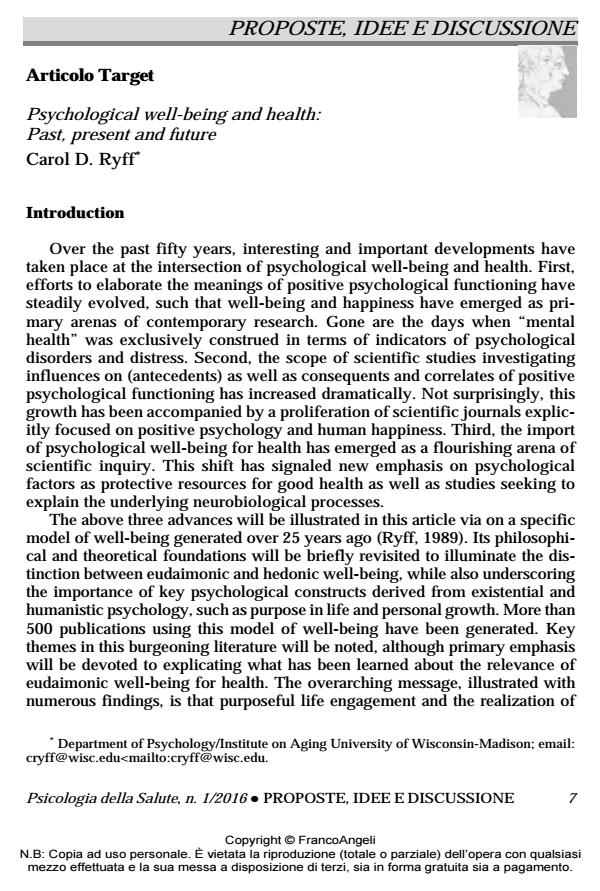Articolo Target. Psychological well-being and health: Past, present and future
Titolo Rivista PSICOLOGIA DELLA SALUTE
Autori/Curatori Carol D. Ryff
Anno di pubblicazione 2016 Fascicolo 2016/1
Lingua Inglese Numero pagine 20 P. 7-26 Dimensione file 118 KB
DOI 10.3280/PDS2016-001002
Il DOI è il codice a barre della proprietà intellettuale: per saperne di più
clicca qui
Qui sotto puoi vedere in anteprima la prima pagina di questo articolo.
Se questo articolo ti interessa, lo puoi acquistare (e scaricare in formato pdf) seguendo le facili indicazioni per acquistare il download credit. Acquista Download Credits per scaricare questo Articolo in formato PDF

FrancoAngeli è membro della Publishers International Linking Association, Inc (PILA), associazione indipendente e non profit per facilitare (attraverso i servizi tecnologici implementati da CrossRef.org) l’accesso degli studiosi ai contenuti digitali nelle pubblicazioni professionali e scientifiche.
Research on psychological well-being and its links to health has flourished in recent decades, signaling an important shift toward studying human strengths and resources. This article briefly details a eudaimonic model of well-being (Ryff, 1989) and examines the proliferation of research growing up around it. Evidence is summarized on the protective benefits of well-being for health, measured in terms of lower profiles of biological risk (e.g., inflammatory markers, cardiovascular risk factors) as well as reduced risk of disease (e.g., Alzheimer’s, stroke, myocardial infarction) and longer length of life. Eudaimonic well-being has also been linked with salubrious gene expression profiles. Given these health benefits, interventions to promote well-being (both in clinical and community contexts) are briefly noted. Future directions include the need for more rigorous longitudinal inquiries, including in diverse cultural contexts. The arts and humanities offer promising new directions for studies of well-being and health, while, paradoxically, negative experiences also need further inquiry. Encounters with life adversity are relevant for deepened understanding of human resilience. Alternatively, focusing on prominent forms of contemporary malevolence (greed, corruption) offers a route for illuminating how the well-being of many can be undermined by self-interests of the few in positions of power and privilege.
Parole chiave:Eudiamonic, well-being, health benefits, humanities
- Comparison of the Effectiveness of Acceptance and Commitment Therapy and Logotherapy on the Psychological Well-being and Death Anxiety of Women with AIDS Hadi Akbarinejhad, Pariya Faroughi, in Qom Univ Med Sci J /2021 pp.48
DOI: 10.52547/qums.14.11.48 - Marginal notes on Ryff's vision of psychological well-being Saulo Sirigatti, in PSICOLOGIA DELLA SALUTE 1/2016 pp.34
DOI: 10.3280/PDS2016-001004 - Comparison of the Effectiveness of Min Dfulness- Based Cognitive Therapy with Compassion- Focused Therapy on Resilience and Psychological Well- Being of Subjects with Multiple Sclerosis Morteza Akbarpor, Maryam Sharifiyan Ghazijahani, hadi Smkhani akbarinejhad, in The Neuroscience Journal of Shefaye Khatam /2021 pp.60
DOI: 10.52547/shefa.9.4.60 - Mental wellbeing in the Anthropocene: Socio-ecological approaches to capability enhancement Ross G. White, in Transcultural Psychiatry /2020 pp.44
DOI: 10.1177/1363461518786559 - Effectiveness of mindfulness-based stress reduction therapy on sleep quality and psychological well-being of women with epilepsy Nazanin AminKazemi, Fateme Mohammadi, Hadi Smkhani Akbarinejhad, in Medical Sciences Journal of Islamic Azad University /2024 pp.274
DOI: 10.61186/iau.34.3.274 - Predicting Cognitive Emotion Regulation Strategies and Psychological Well-Being in FARAJA Forces Based on the Level of Physical Activity M. Zare Shahabadi, H. Samadi, H. Abbassi, S. Abbedinzade Masoole, in Iranian Journal of War and Public Health /2023 pp.233
DOI: 10.58209/ijwph.15.3.233
Carol D. Ryff, Articolo Target. Psychological well-being and health: Past, present and future in "PSICOLOGIA DELLA SALUTE" 1/2016, pp 7-26, DOI: 10.3280/PDS2016-001002